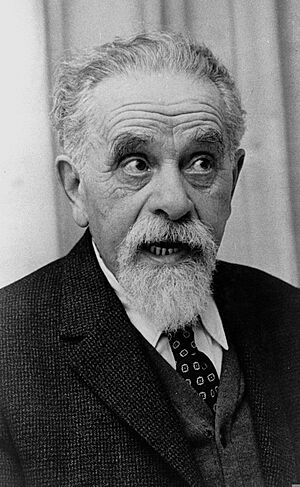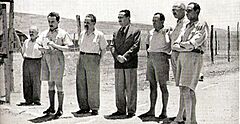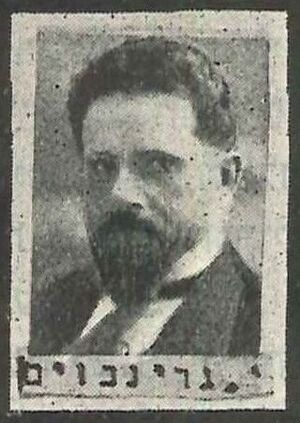Yitzhak Gruenbaum facts for kids
Quick facts for kids
Yitzhak Gruenbaum
|
|
|---|---|
 |
|
| Ministerial roles | |
| 1948–1949 | Minister of Internal Affairs |
| Personal details | |
| Born | 24 November 1879 Warsaw, Russian Empire |
| Died | 7 September 1970 (aged 90) Gan Shmuel, Israel |
| Political party | Bloc of National Minorities |
Yitzhak Gruenbaum (Polish: Izaak Grünbaum, Hebrew and Yiddish: יצחק גרינבוים; 1879–1970) was an important leader of the Zionist movement among Polish Jews. He was active between World War I and World War II. He also led the Yishuv, which was the Jewish community in Mandatory Palestine before Israel became a country. Gruenbaum was the very first Minister of Internal Affairs for the State of Israel.
Contents
Life Story
Yitzhak Gruenbaum was born in Warsaw, which is in Poland. When he was a student, he studied law. At the same time, he started working for the Zionist movement. He also became a journalist.
He was the editor for several newspapers and magazines that were popular among Polish Jews. These included the Hebrew newspaper Ha-Zefirah and the Hebrew weekly Ha-Olam. When he was the editor, the Yiddish daily newspaper Haynt started to support Zionism more.
In Poland, Gruenbaum led a group called the Radical Zionist faction. In 1919, he was chosen to be a member of the Sejm, which is like the Polish parliament. There, he worked with Apolinary Hartglas to create a "Jewish bloc." This group brought together most of the Jewish political parties.
He was key in helping different minority groups in the Sejm work together. These groups included Germans and Ukrainians. In 1922, they formed an alliance called the Bloc of National Minorities. This group worked to protect the rights of minority people in Poland. Because of his efforts, more Jewish people were represented in the Sejm. This also helped political Zionism grow. Gruenbaum was known for being brave and strong in defending minority rights. He also disagreed with the ultra-orthodox party Agudat Israel and some Jewish groups trying to influence politics.
In 1932, Gruenbaum moved to Paris. The next year, in 1933, he moved to Mandatory Palestine. He moved after being chosen for the board of directors of the Jewish Agency. This happened during the Eighteenth Congress of the Zionist Organization.
Working for Zionism
During the Holocaust, Gruenbaum was part of a "Committee of Four." This committee was formed at the start of World War II. Its job was to stay in touch with Polish Jews and help rescue them. In 1942, the Jewish community in Palestine learned about the mass killings by German forces in Eastern Europe. Gruenbaum was then chosen to lead a 12-member Rescue Committee. This committee had people from different political groups. Because of the difficult times, their rescue efforts did not achieve much.
After the war, he faced a personal challenge involving his son, Eliezer Gruenbaum. His son had survived the Holocaust. In Paris, two other Holocaust survivors accused Eliezer of being a Kapo. A Kapo was a prisoner who was forced to supervise other prisoners. They said he was cruel to Jewish prisoners. During his son's time in detention and trial, Gruenbaum stayed by his side. When the case ended, Eliezer moved to Palestine. However, he continued to be criticized by right-wing and religious groups. These groups wanted to make his father look bad. Not long after, Eliezer was killed in the 1948 Arab-Israeli War.

In 1946, Gruenbaum was one of the Jewish Agency leaders arrested by the British. He was held in a detention camp in Latrun.
He spent his later years living on Kibbutz Gan Shmuel. He passed away in 1970.
Political Career
|
Yitshak Gruenbaum List
רשימת יצחק גרינבוים
|
|
|---|---|
 |
|
| Leader | Yitzhak Gruenbaum |
| Founded | 1948 |
| Dissolved | 1949 |
| Ideology | Zionism |
| Political position | Centre-left |
| Election symbol | |
| יג | |
Gruenbaum was one of 13 leaders who formed the first temporary government of the new State of Israel. As a member of the Provisional State Council, he signed Israel's declaration of independence. From 1948 to 1949, he was a member of this council. He also served as the first Minister of the Interior during this important time.
At first, he was part of the General Zionists party. But over time, his political views moved more to the left. He became a supporter of Mapam, a socialist-Zionist party. He was known for being a secularist, meaning he believed in separating government from religious rules. Gruenbaum led his own political group in the elections for the first Knesset (Israel's parliament). However, his group did not get enough votes to win a seat.
Later, he was a candidate for President in the 1952 presidential election. Other candidates included Yitzhak Ben-Zvi from Mapai, Peretz Bernstein from the General Zionists, and Mordechai Nurock from Mizrachi. However, Ben-Zvi won the election.
Journalism and Books
He worked as an editor for several publications. These included the Hebrew newspaper Ha-Zefirah, the Hebrew weekly Ha-Olam, and the Yiddish daily Haynt.
Gruenbaum was also the editor of the "Encyclopedia of Diaspora Communities." He wrote "The Zionist Movement and its Development" and many other books.
Remembering Yitzhak Gruenbaum
Alonei Yitzhak, a special youth village in Israel, is named after him. It is located near Binyamina in northern Israel.
Images for kids



